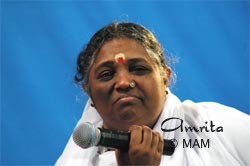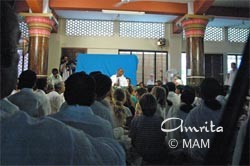
July 31, 2006 — Amritapuri
Amma had been giving darshan in North America for two months. Regardless, the day after her return to Amritapuri, she promptly came to the temple to give her first meditation and question-and-answer session with the ashram residents.
When Amma is in Amritapuri, the brahmacharins and householder devotees who live here can easily come to her for answers to their questions and to have any doubts cleared. But with Amma traveling more than six months out of the year, there are many times when one has to wait until Amma’s return to ask something.
This was the case for one American woman living in Amritapuri. Her question was waiting on Amma’s peetham when Amma entered the temple.
During the woman’s meditations, she had been having various experiences, and she wanted to know how to take them: “Amma, what sort of attitude and understanding should one have to the various experiences one undergoes during meditation? How much does one’s mental attitude affect how we experience these? For instance, at one time it might be a joyous experience of motherly love and, at another time, something very impersonal, like forces of nature, like little flashes of lightning and strong gusts of wind acting upon one’s being… What role does the Guru play in all of this? Why do many people go insane or become delusional and egoistic and only a few safely make it to the Goal?”
Amma told the woman that such experiences arise out of innocence. And that although one can take encouragement from such experiences, that they should not be given much importance.
“Because of one’s innocence one may have such experiences; one may feel motherly love, see divine lights or feel a cool breeze… But you should go beyond all such experiences,” Amma said. “You are on the path to realizing your oneness with God, with the Self. While traveling on a path, we see many things around us. But if we stop to see these things and forget our goal, we may never reach the goal.”
Amma said that all experiences are at the level of the mind and that the goal of spiritual life is to go beyond the mind. She said ultimately such experiences are much like dreams and, as such, they should only be given the same importance as a dream.
“The real important thing is the control we have over our mind in all situations,” Amma said. “If someone becomes angry at us, we should not react and become angry also. We should reflect, ‘Whom am I becoming angry at?’ In such situations we should remember that it is all the Atma, the Supreme Self. We should think, ‘The consciousness that is within me is within that person also. Can consciousness become angry? And if all is one, to whom can it express its anger?’ We should give more importance to the Self and not the body.”
In response to the part of the woman’s question regarding the Guru’s role in such experiences, Amma said that the Guru is like a mirror, reflecting whatever mental shortcomings one has. Amma said, “When you find yourself reacting in a negative way to different situations, you should contemplate upon the workings of your own mind, remind yourself of the Goal, and then rectify your behavior. We should take every situation that comes in life as an opportunity for us to learn.”
Amma then explained how dangerous it is for someone to focus on and pursue mystic experiences in spiritual life. Amma said that when people get hung up on the pursuit of experiences, they often squander their entire lives wandering from place to place looking for places where the “energy feels good.” Others fall victim to spiritual entrepreneurs, who charge, say, $5000, to turn one into an avatar. “With the $5000, they say you can become an avatar after a three-week course. But without the money, it won’t happen,” Amma said. “In a search for newness, for new experiences, people go and follow all these things.”
Amma then said that charging money for teaching meditation, etc. is like a mother asking her child for payment for breast milk.
Amma said, in fact, liberation is not something one can be given; it must come from within: “If the ancient sages had to do austerities for ages in order to realize that state, how then could one get it just by paying someone some money?” Amma derided.
“When we eat sugar, we experience the sweetness. But we still are different from the sugar. We shouldn’t be an experiencer, we should become That, we should become the sugar, we should become the sweetness.”
Once again stressing how the balance of mind during all experiences is much more important than what the mind actually experiences, Amma quoted the Gita “samatvam yoga ucyate” * “Maintaining equanimity of mind in all situations should be our focus. It verily is the goal,” Amma said.

In response to the part of the woman’s question regarding people falling from the spiritual path, Amma said that the most important thing to do if one falls is to get back up and continue on. “There are many, many trees, and there can be many, many flowers on a tree. But not all the flowers become fruits. Some may fall away, others may wither, some may be eaten by insects. Along the spiritual path, there may be many falls, but if one does fall, the important thing is to not remain there, lying on the ground, enjoying the situation. You must get up and put in effort to walk further. Whatever effort you put in on this path will never be lost. You always have it with you. To realize our oneness with God may take our entire lifetime—it may take several lifetimes. You have to put in continuous effort. There is no other way. Everyone has to walk this one path. If you come upon an obstacle, you have to surmount it.
“Don’t focus on fleeting experiences,” Amma reiterated. “The things we see (pertaining to experiences mentioned in the question) are at the level of the mind. We should go beyond the mind.”
—Sakshi
*yoga-stah kuru karmani samgam tyaktva dhananjaya
siddhyasiddhyoh samo bhutva samatvam yoga ucyate
(Bhagavad Gita 2nd chapter, verse 48)
[Remaining steadfast in yoga, Oh! Dhananjaya [Arjuna], perform actions, abandoning attachment, remaining the same to gain and loss alike. This equanimity of mind is called yoga.]
